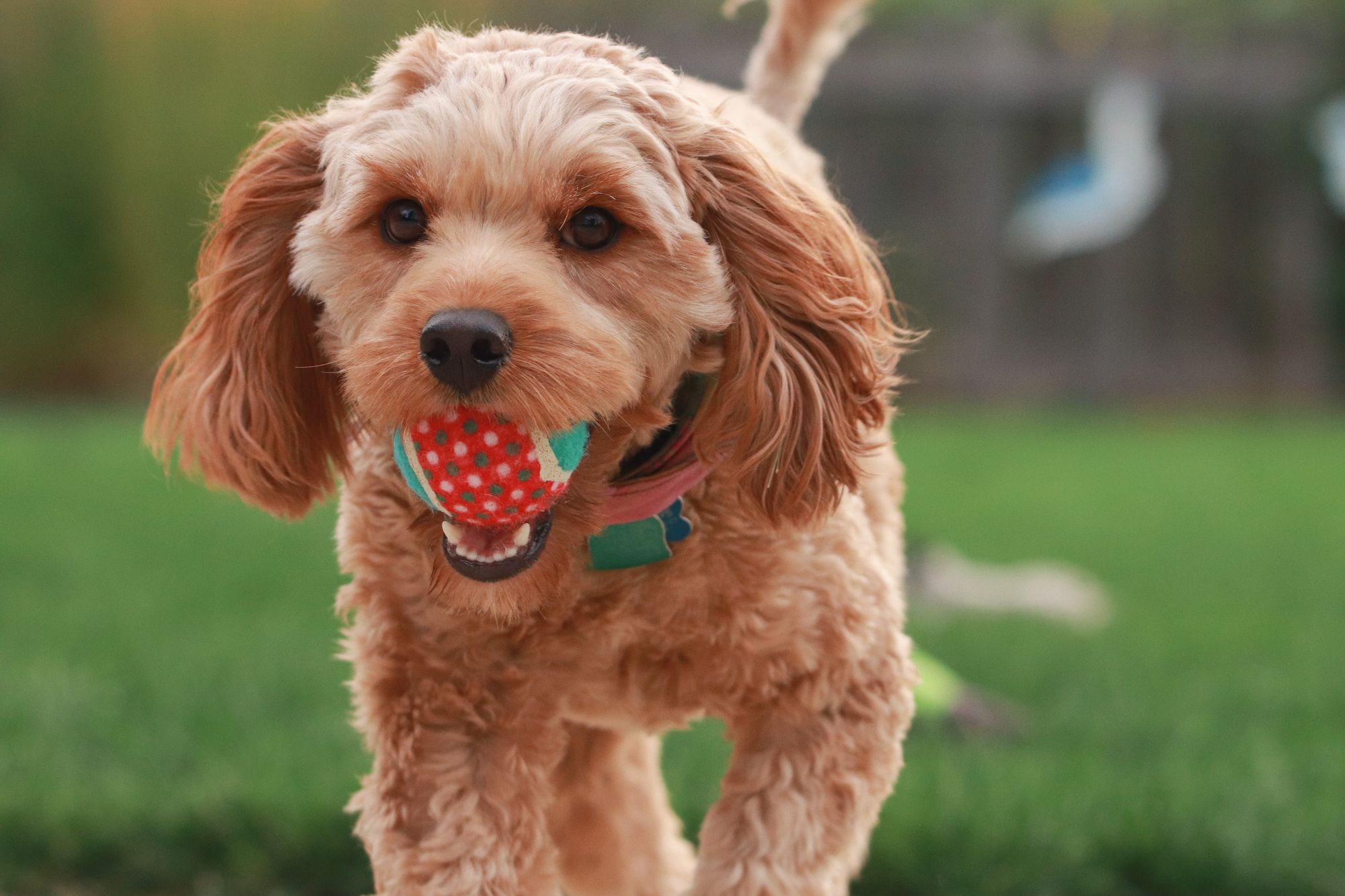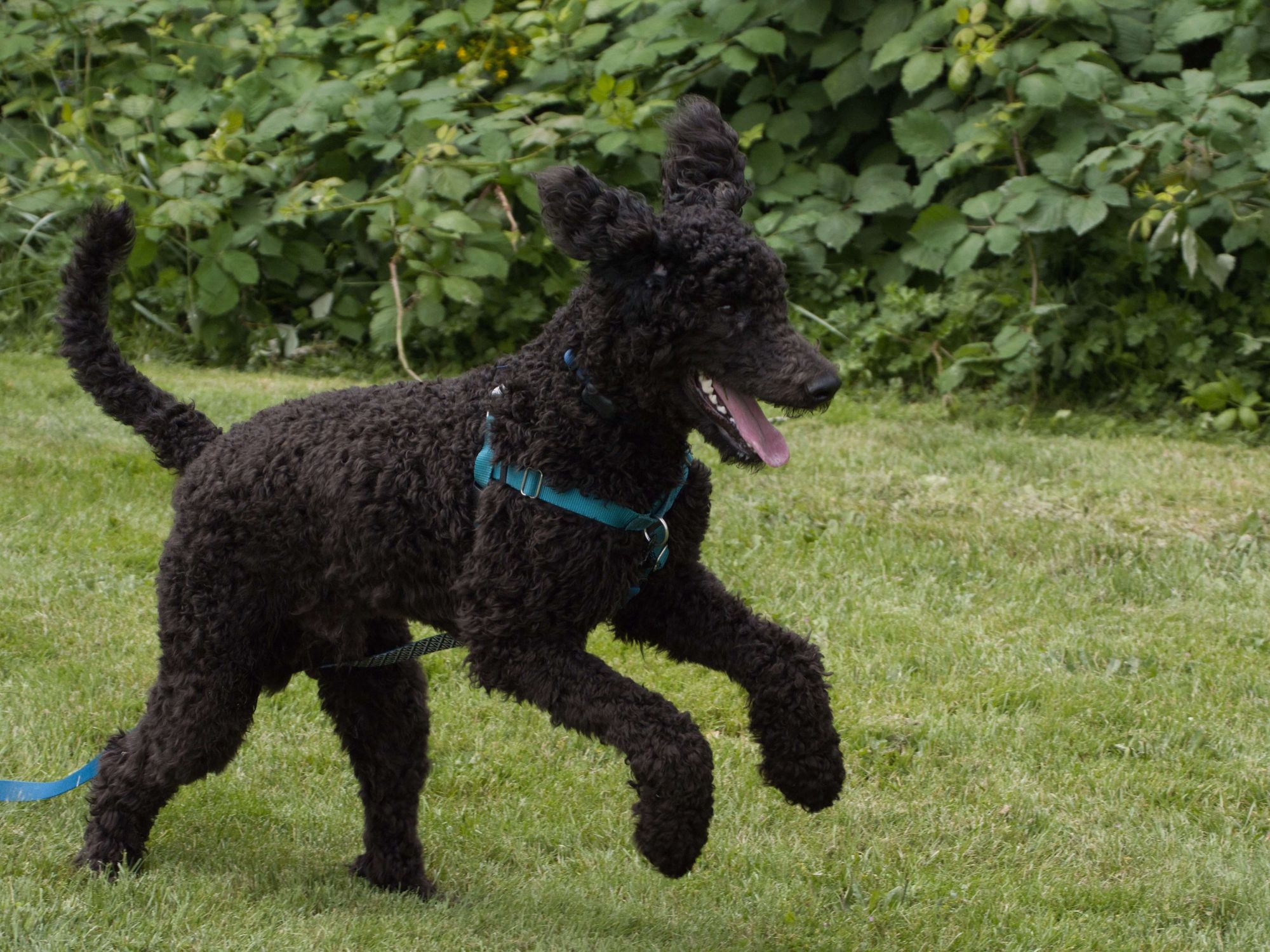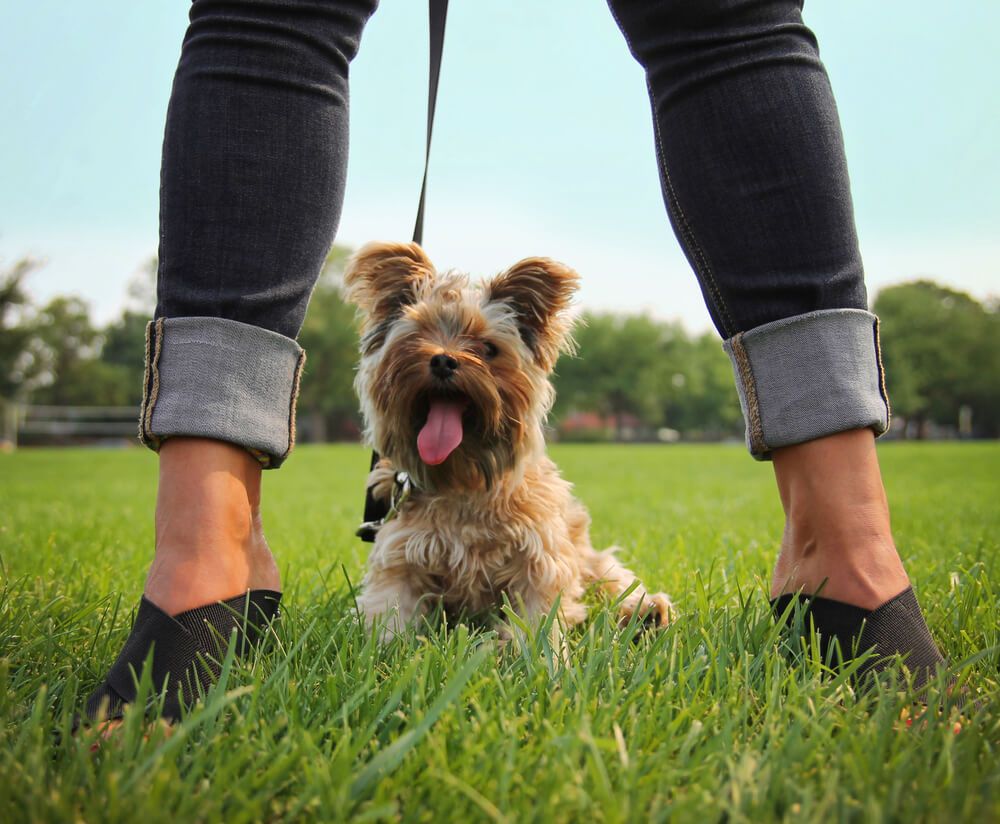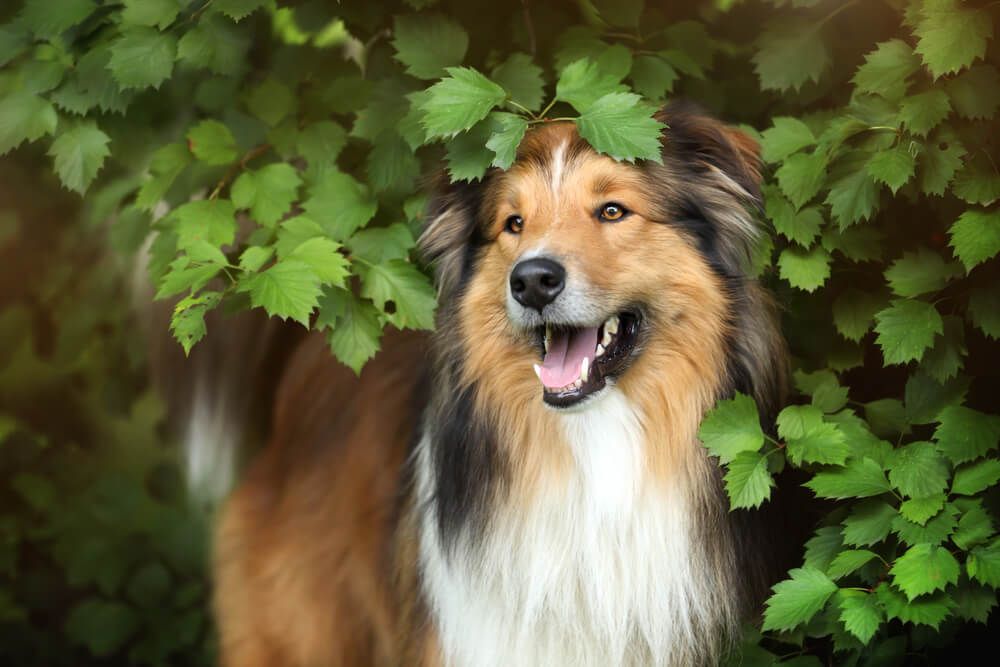Hey Ollie blog readers! We’re offering you an exclusive 60% OFF your starter box! Try now!
What happens when you cross two of the smartest and friendliest dog breeds? You get a goldendoodle—a funny, intelligent, and often exuberant dog that looks and loves like a real-life teddy bear.
Despite their curb appeal, this cute and comical breed isn’t the right fit for every household. Learn everything you need to know about the breed, including the goldendoodle’s pros and cons, and the lifestyle for which this happy-go-lucky designer dog is best suited.
About the Goldendoodle Dog Breed
The goldendoodle breed emerged in the late 1990s, although the first litter’s exact birth date is unknown. The Goldendoodle Association of North America (GANA) describes the breed’s dogs as being extremely social, outgoing, and nonaggressive, thriving on human companionship and having a great desire to please and learn.
GANA reminds us that, “Each individual breed (the Poodle and the Golden Retriever) score in the top 4 of the 150 smartest dog breeds.” By extension, this is believed to make the goldendoodle extremely intelligent, with an eagerness to please their owners. Goldendoodles’ generally outstanding temperament and overall health make them great pets, and excellent candidates for therapy and service roles.
The average goldendoodle weighs at least 50 pounds and stands approximately 21 inches tall. In recent years, goldendoodle breeders have responded to the demand for smaller dogs, and as a result, four size categories have emerged—petite, mini, medium, and standard. So, if a traditional goldendoodle is too large for your home or apartment, a petite or mini goldendoodle may be the perfect fit.
Because the goldendoodle’s original breeds come in various coat colors, goldendoodles can also have coats in many color variations. Goldendoodles may be pale and cream-colored, dark apricot, black, or brown. These dogs are not always solid-colored pups and they can have a wide variety of markings, making each dog unique.

Pros of Goldendoodles
1. Intelligent
Because both poodles and golden retrievers are among the smartest breeds, this mix also unquestionably produces smart dogs. Therefore, your potential pup is likely to be quicker than the average canine learner, and may be able to learn more advanced tricks or even get a job as a service dog. Although intelligence is an asset, training and socialization will be key to ensuring your pup uses their brain power for good, rather than for mischief!
How Long Does It Take to Train a Dog?
2. Low to No shedding
This pro is welcome news for allergic dog owners. Although the myth that goldendoodles are truly hypoallergenic is just that, their poodle genes make them a low- to no-shedding breed, making them suitable canine companions for owners who have mild allergies. Goldendoodles can be genetically tested for “furnishings,” which means they have the least shedding coat type and are most appropriate for allergy sufferers.
3. Great Companion Dogs
The goldendoodle’s friendly and outgoing personality makes them a great family pet. This breed relishes human interactions and is affectionate toward kids, other pets, and visitors to the home. Their energy level, enthusiasm, and curiosity make them a natural companion to join you in all activities such as weekend soccer games, jogging around the neighborhood, or simply hanging out on the couch. Like many dogs who love to eat, goldendoodles excessively beg for tasty morsels, especially when they join you at mealtimes.
10 Best Dog Breeds for Families
4. Enjoy Water
If you love the great outdoors and life on the water, the goldendoodle is your perfect first mate. As a mix of two retrieving breeds, the goldendoodle is a natural water lover. Although goldendoodles are stronger swimmers, always supervise them around pools and lakes to ensure they don’t exhaust themselves.
5. Large Size Range
Unlike other breeds’ narrow height and weight categories, the goldendoodle breed offers a suitable size for nearly every home. Although popularity varies from year to year, mini goldendoodles are currently in high demand. Depending on each dog’s poodle lineage, their size and weight vary significantly between and within each category:
- Petite — Shorter than 14 inches, 25 pounds or less
- Miniature (mini) — More than 14 inches tall but under 17 inches tall, typically 26 to 35 pounds
- Medium — More than 17 inches tall but under 21 inches tall, typically 36 to 50 pounds
- Standard — Taller than 21 inches, 51 to 90 pounds
Cons of Goldendoodles
1. They Require Extensive Grooming
The goldendoodle’s coat requires daily brushing and professional bathing and grooming every 6 weeks to keep it healthy and mat-free. Neglecting to care for your goldendoodle’s coat can result in painful skin issues and uncomfortable matting. In addition, a goldendoodle with unkempt hair can experience injuries that negatively affect their mobility. For example, untrimmed paw pad hair can cause your dog to slip and fall. Grooming for a standard goldendoodle can cost more than $100 per session, before you tip your groomer. The cost may be higher if your pup’s coat is damaged. If you don’t want to spend the money for grooming sessions or learn to groom your dog at home, forgo bringing home a goldendoodle, and look for a wash-and-wear dog breed that has a smooth coat.
2. They Need a Lot of Exercise
Goldendoodles are the offspring of two sporting breeds meant to work long days in the field hunting and retrieving birds, so you should not be surprised that these dogs need more than a casual walk around the block each day. Plan to spend at least 30 to 60 minutes per day providing your goldendoodle with physical and mental exercise, which can include teaching them tricks, romping in the backyard, playing with puzzle toys, or participating in dog sports classes such as agility, scent work, or rally.
Exercising Your Dog: Tips and Recommendations
3. Their Popularity Makes Adoption Expensive
Because of these adorable and coveted pups’ rising popularity, you can expect to pay a significant adoption or purchase fee. If you obtain your puppy from a reputable breeder, expect to pay at least $1,500, with many pups costing three times as much.
Unless you have a specific need for a purpose-bred puppy or dog, you can currently find many wonderful goldendoodles in shelter and rescue facilities. As a bonus, most of the adoptable dogs in shelters and rescues have already been spayed or neutered, and their necessary veterinary care (e.g., vaccines, heartworm testing) is usually up-to-date. Many goldendoodle-specific rescue groups have spread throughout the country, which can help simplify your search. If you have your heart set on a goldendoodle, don’t let the steep cost discourage you. Search online to find an available rescue pup in your area.
4. Separation Anxiety Is Common
Some goldendoodles become so dependent on social contact that they develop separation anxiety. When left alone, these dogs experience intense panic and fear, which can manifest as destructive behavior (e.g., digging, chewing), self-injury, and house soiling.
Preventing separation anxiety is easier than treating the condition, so plan to build your goldendoodle puppy’s confidence and independence right away. Start with crate training and practicing calm interactions when you prepare to leave and when you return.
Tips for Preparing Your Home for a Goldendoodle Puppy
The secret to raising a successful goldendoodle puppy is preparation. You’ll be incredibly busy after your four-legged friend arrives, so ensure you have everything prepared in advance, including:
- Puppy-proofing your home — Remove dangerous items, including electrical cords, houseplants, choking hazards, and household toxins, from your home or secure them out of your puppy’s reach. Install puppy gates to keep your goldendoodle away from off-limits or unsafe areas.
- Gathering puppy supplies — Ensure you have important essentials such as a healthy puppy food, crate, treats, leash and collar, identification tags, age-appropriate toys and chews, and cleaning supplies.
- Planning your puppy’s routine — Plan out your puppy’s daily schedule, including times you can devote to exercise and training. Sticking to a routine helps puppies build confidence and adapt quickly to their new home.
- Researching puppy care services — Contact local groomers and trainers about their services. Schedule meet-and-greet sessions to ensure you’ve found a suitable match. Make an appointment with your veterinarian to ensure your puppy is in good health.
Potential Health Problems Associated with Goldendoodles
Sadly, goldendoodles aren’t immune to health problems. Like most mixed breeds, goldendoodles inherit many genetic conditions from their purebred ancestors. Common goldendoodle health concerns include:
- Hip dysplasia — This orthopedic condition occurs when the dog’s hip joint is poorly formed. Over time, this condition leads to arthritic changes and decreased mobility.
- Allergies — Environmental and food allergies may manifest as skin or digestive problems.
- Addison’s disease (i.e., hypoadrenocorticism) — Addison’s disease is caused by decreased hormone production in the adrenal gland.
- Hypothyroidism — Decreased thyroid gland function can result in negative changes throughout the body, including decreased metabolism, weight gain, mental dullness, poor skin and coat condition, and cold intolerance.
Is a Goldendoodle a Good First Dog?
With proper training and socialization, the goldendoodle can be a great first dog for your family. These fun-loving and friendly dogs love to please their humans and make excellent companion dogs for people of all ages. If you are thinking about adding an intelligent, low-shedding, and athletic dog to your family—and you don’t mind the extra brushing and grooming—the goldendoodle might be a perfect choice.
For additional resources on acquiring and raising one of these amazing dogs, reach out to GANA. The organization can help you find a reputable breeder, and provide resources on how to best care for your puppy.
Raising a Puppy: The Ultimate Guide
Once your goldendoodle is settled in at home, think about the food you want to feed your precious pup. At Ollie, we know plenty about feeding and nourishing goldendoodles, because they belong to one of the top five most popular breeds among our pet customers. Their parents find that our delicious recipes keep their pups happy, healthy, and full of only the good stuff. They always tell us that their pups love to see the big orange boxes delivered to the door and are always eager to dig into our wholesome, nutritious offerings, straight from our signature Puptainers!
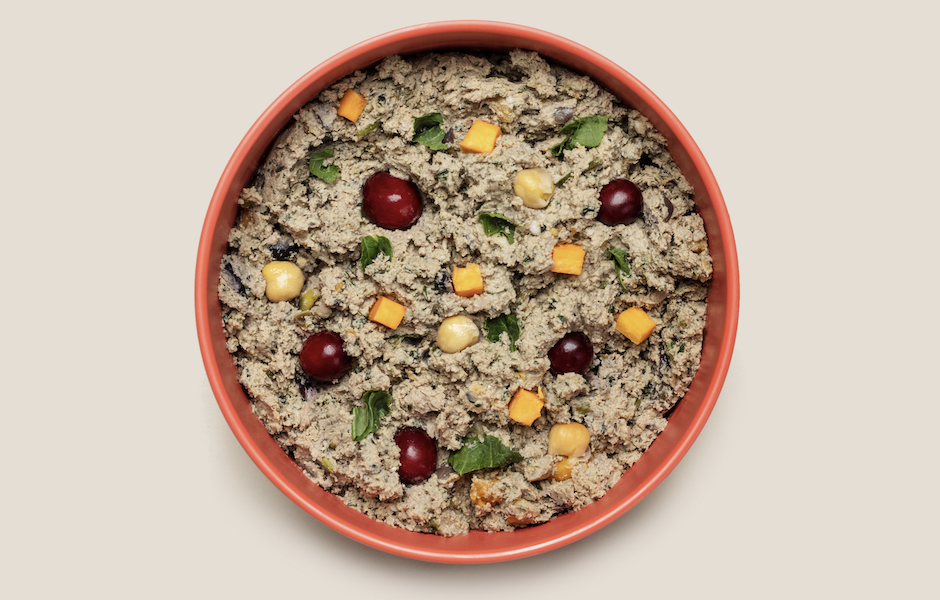

Find Out Which Recipe Plan is Right for Your Dog’s Needs
Get 50% of your first box of Ollie’s fresh
delivered meals today!
The Ollie blog is devoted to helping pet parents lead healthier lives with their pups. If you want to learn more about our fresh, human-grade food, check out MyOllie.com.
Tagged As:

The nutrition your dog needs,
the food they want.

Enjoying our articles? Subscribe our Newsletters and get new articles directly to your inbox
You might also like
21 July 2025
6 MINS READ
Poodle Breed Guide: Pros and Cons of Poodles
Curious about Poodles? This detailed Poodle breed guide breaks down the key pros and cons, plus tips on caring for Standard, Miniature, and Toy Poodles.
25 March 2025
6 MINS READ
Yorkie Dog Breed Guide: Yorkie Pros & Cons
Thinking about adding a Yorkie to your family? This Yorkie dog breed guide covers the pros and cons, care tips, and what to expect with these tiny, spirited pups.
25 March 2025
5 MINS READ
Collie Temperament: 6 Personality Traits Explained to Get to Know Collies Better
Described by the American Kennel Club as devoted, graceful and proud, the collie is ranked 38th on their list of most popular breeds. While many people think of Lassie when they think of the coll…
